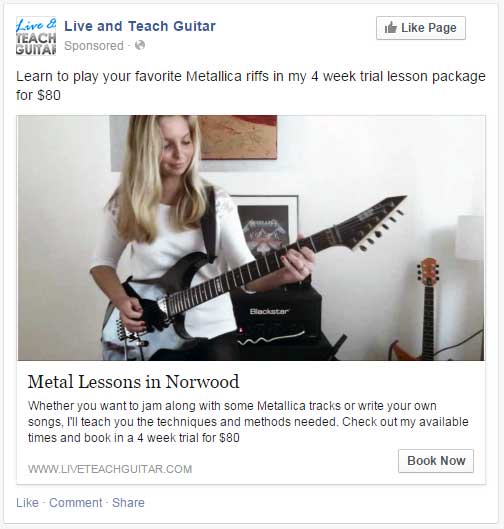The way people search for guitar teachers has been changing over the last few years. What used to bring you new guitar students no longer works as well today. The demand for guitar teachers has changed but if you can understand how the demand has changed, you can actually benefit from these changes.
Let's have a look at how you can attract more guitar students in 2015.
Why traditional marketing is losing effectiveness
In the past all a guitar teacher had to do to attract new students was to place an ad in a local newspaper, place a few posters around town and send out some flyers. We've been working closely with guitar teachers over the past few years and it's crystal clear to us that those methods are rapidly losing effectiveness. It can take well over 1000 flyers to generate one phonecall/email from a potential student. Newspaper ads usually don't receive any responses.
There's a simple reason why these methods aren't as effective anymore: almost everybody now search online to find local services. While that might sound obvious, it's clear that many guitar teachers either don't believe that's true or don't understand why they should change their approach. If a person actively looks for a guitar teacher, they will search online. That person isn't going to walk down to the local community board to see your poster and they aren't going to sit around in case they receive a flyer. They will simply load up Google and find a teacher.
There's another reason why traditional marketing is losing effectiveness: mobile devices. Well over two thirds of Americans own a smartphone. That means if somebody ever has the spontaneous urge to start learning guitar, the chances are they will simply search online for ways to get started.
What does all this mean for you?
There's two key points to take away from this so far:
1. Offline marketing methods will be ignored now and in the future
People don't respond to direct mail as they did in the past and the trend is pointing down. That means if your main method of attracting new students is with offline methods (eg: posters and flyers), you're going to struggle in the future.
2. You need to be online
Not only do you need to be online, but you need to have your own website. A listing in an online directory or an ad in craigslist isn't good enough. You need to have your own website you can control. Fortunately it's relatively easy to set up a website today and anybody can do it.
Guitar Teachers Are No Longer The Go-To Option
In the past before YouTube, when somebody decided to learn guitar they would automatically look for a local guitar teacher. It was relatively easy for a guitar teacher to fill their timetable up. In 2015, you need to actively seek out potential students.
In 2015 when somebody wants to learn guitar, they can simply go to YouTube and instantly access thousands of video lessons. While you as a teacher know that you can offer far better quality lessons than any video, students today do not see it that way. The convenience and free access to online lessons makes them question why they need a guitar teacher. Why should they pay for a guitar teacher when they have all the videos they need available at any time on YouTube?
If you're struggling to find new students, that's why. Guitar teachers are no longer the go-to option for students and unless you change your approach, students in 2015 won't even give you a chance.
How to Succeed as a Guitar Teacher in 2015
If you try to promote yourself as a guitar teacher like you have in the past, you're going to have a hard time in 2015. In 2014 we worked closely with a lot of guitar teachers who were suddenly finding it very hard to find new students. Fortunately there is a solution and when applied properly teachers suddenly discovered that they could fill up their timetables instead of struggling to hold on to students.
There's too much detail to cover in one article, so we'll explain the outline of what you need to do to succeed as a guitar teacher in 2015:
Focus on your website
If you don't have a website, set one up today - without one you will not succeed in attracting new students consistently.
If you do already have a website, make a commitment to work on it and apply the best practices and strategies available today. The truth is most guitar teacher's websites are terrible - they usually contain a handful of pages with basic information and nothing else of value. We run workshops to help guitar teachers improve their websites and we start out by analyzing and scoring every teacher's website before the workshop. The typical score out of 100 for most teachers was somewhere between 20 and 30.
That's a sign that there's a lot of room for improvement.
Your website will be your most important marketing tool in 2015 as a guitar teacher and we've been working very closely with guitar teachers to help them get their websites to a point where they start filling their timetable.
Don't waste money on printed advertising
If you've been thinking about spending money on print ads, you can stop thinking about it now. Over the last year we've talked to a wide range of guitar teachers who have spent money on print ads and be disappointed with the lack of response. While newspaper ads used to be effective in the past, today they're a waste of money. Don't spend money on newspaper ads, YellowPages listings or any other printed advertising. They just don't work anymore.
Give your business a complete review
What's your target market? What separates you from other guitar teachers in your local area? ("I go the extra mile for my students" isn't a good answer)
The guitar teachers who ultimately succeed understand who they're trying to target, how they will target them and what methods and strategies will help them work towards their goals. Giving your guitar teaching business a thorough review is a great way to find out what areas you're doing well in and what areas you need to work on. By giving your business a review we don't mean print a new batch of business cards or change your logo design, we mean to look at the areas that really make a difference and figure out how you can make changes that will impact your results.
Study Marketing
When some people think of marketing, they imagine themselves handing out business cards or coming up with a catchy slogan to go with their shiny logo. Hopefully you don't think of marketing that way because it's well over 50 years behind the times. If your marketing strategies involves business cards and slogans, you're going to have a very tough time attracting new students. Fortunately it's very easy to learn about marketing today and you will be surprised how dramatically your results can change just by changing your approach slightly.
Guitar Teacher Checklist for 2015
There are so many different ways you can work on your guitar teaching business this year. The list of activities that follow focus on the most important and effective ways you can achieve better results in 2015. The courses, workshops and resources linked to can mean the difference between struggling to find new students and filling up your timetable.
If you want to succeed as a guitar teaching in 2015, make a commitment to work through this list:
This workshop will go through your entire website and help you apply the most effective marketing strategies and tools available today. By the end of the workshop you will have an effective website set up to not only attract potential students in the right way, but it will help raise your credibility and reputation as a guitar teacher.
If you only did one thing in this list, we highly recommend joining our Website Referral Machine Workshop.
Our popular Business Fundamentals Course gives your business a complete review and will help you identify any problems or opportunities you may have missed in the past. It's spread over 12 weeks so you will have plenty of areas to work on without it feeling overwhelming. Every important topic is covered from goals to marketing so whether you've been teaching for 20+ years or are just getting started, it's worth working through this course.
You may have heard about SWOT analysis but aren't sure how it applies to you as a guitar teacher. That's why we created the SWOT Analysis Course - to spell out what a SWOT analysis is and explain how it applies to you as a guitar teacher. The course includes a case study so you can understand how to apply it to your own situation. This is a great way to find any opportunities or problems you may have missed in the past.
Marketing is the key to your success. If you understand marketing principles properly and can apply them to your situation, you will eventually succeed. There are a lot of methods and tactics out there, but without a proper understanding of marketing principles, they never seem to work out. How many times have you tried something only for it to fail? Our Marketing 101 course will give you the principles needed to properly apply any marketing method.
Extra Challenge: Earn an income online
This challenge isn't for everybody, but if you have been interested in earning an income online on the side to your regular guitar lessons, we've created a course just for you. Our $100 per month Challenge walks you through how to start selling your own product or service online and build it to the point where you start earning more than $100 every month. $100 per month might not sound like much, but once you build it up to that point, you will have all the knowledge and expertise needed to grow it from there. Our ultimate goal is to help guitar teachers earn $1000+ per month, and this course is a great first step.
Take the $100 per month Challenge if you're keen on building an income on the side to teaching.
Need help along the way?
It should be clear by now that there are a lot of challenges ahead of you, but at the same time there's a lot of resources available to guide you along. Whenever you get stuck or need a helping hand, Live and Teach Guitar is always here to help out.
Good luck in 2015 and get started working on your guitar teaching business now!






